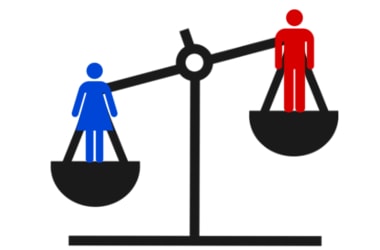
Women are fighting for rights and women are showing the world that they are equals with men in every field of life. A very surprising irony on the feminist tide is that women criminals are fighting for leniency and not equality. SC has been brought to attention by a plea filed against a lower court for granting leniency to a woman who helped a man in robbery. Her imprisonment was reduced to 2 years, which was further substituted with a fine on grounds that she had three children to raise, two of who were mentally challenged.
SC has granted that leniency can be shown to women with three minor children to look after. This will not apply to women involved with terrorist groups. Is this a fair decision? Can gender be the parameter for deciding upon punishment for crimes?
Yes:Women are more likely to learn from mistakes:Not because they are the weaker sex but because most of them take to small crime such as robbery and theft in order to bring back bread for their children. If they have minor children to support, it is only fair that they are shown leniency enough to teach them a lesson, rehabilitate them and leave them on grounds that they would be kept under scrutiny of law.
Orphaned children:Put the father behind the cell and the mother will find ways to keep her children fed and sheltered. Put the mother behind bars and the father leaves them orphaned in cases of poor families. These children will not have a future. They are either going to be begging on railway stations and traffic signals or become a victim of human trafficking or child labour.
Less violent:Women in prison are less violent than men. This has been proven by a study in US which shows that majority of women prisoners are nonviolent offenders with poor education, no employment experience and several histories of abuse from childhood through adulthood. They are still less violent and can be given help with hope that they are less likely to go down the same path again.
Closing women jails:UK joined the movement where they pleaded for closing jails of women and to replace it with community service and rehabilitation in case they were addicted or in need of counselling. It was also argued that women can be taught to be good easier than their male counterparts.
Affecting them adversely:Jail time affects women far more adversely that it does to men. They are more likely to harm themselves in this phase. It affects their family and their social image when they return back and the society is less likely to be any friendly to them. They are more at the risk of catching infections due to lack of hygiene at prisons or fall prey to unbiased rules of the prison.
No:More women into crime:Yes, there are lesser women in jails than men but this proportion will change drastically if they are shown any leniency. This would work as the loophole as men will involve women in the crime who will be assured that they will not face imprisonment for long. Crime is the same for both and punishment should be the same too.
What happened to equality?The whole fight for equal rights will go in vain if women are shown leniency when it comes to punishment for crime. The crime will still be a huge loss to the victim regardless of whether it was done by a man or a woman. It is only fair that the women are treated equally in this regard too.
Future of children:Either by poverty or abuse, the women criminals are harsher mothers too. What kind of future are they going to give the children when they are into theft and robbery? These children should rather be raised at state run orphanages where they could be counselled too.
Human trafficking on lose:A court in UK did not impose imprisonment on three women accused of trafficking a 17 years old into prostitution. This is also an issue in India where most of the prostitution industry is run by women who are involved in trafficking of minor girls. Leaving them on lose is unjust and should not be given any chance of discussion.
Hard and strict rules cannot be laid in this regard as cases differ from each other. In some cases, it is fair to give the woman some leniency depending on her behaviour and ability to raise children. In other cases, equal punishment should be ideal.